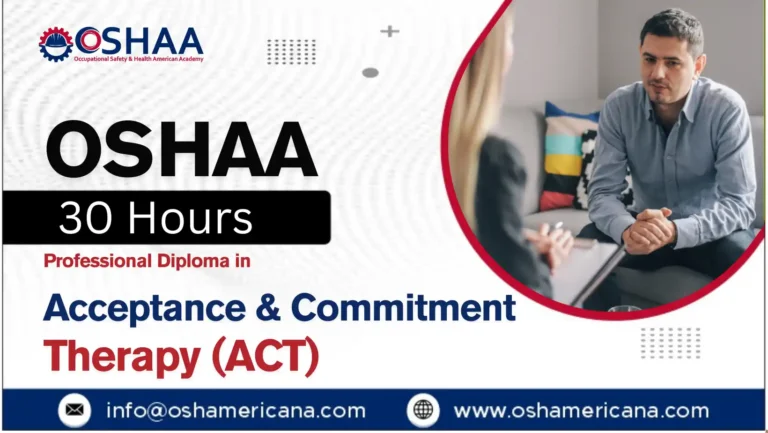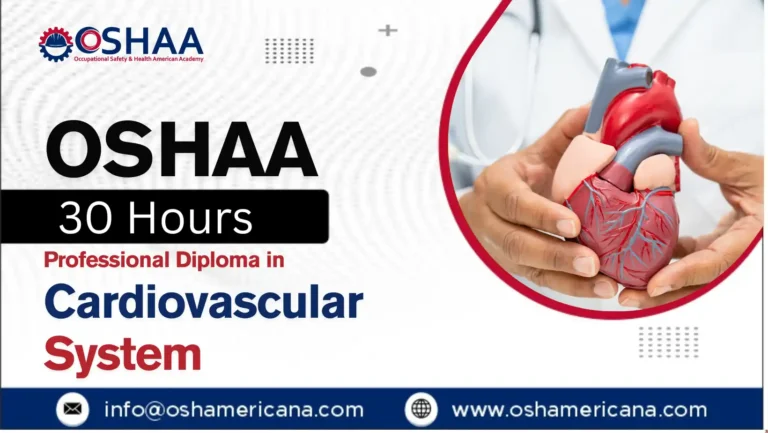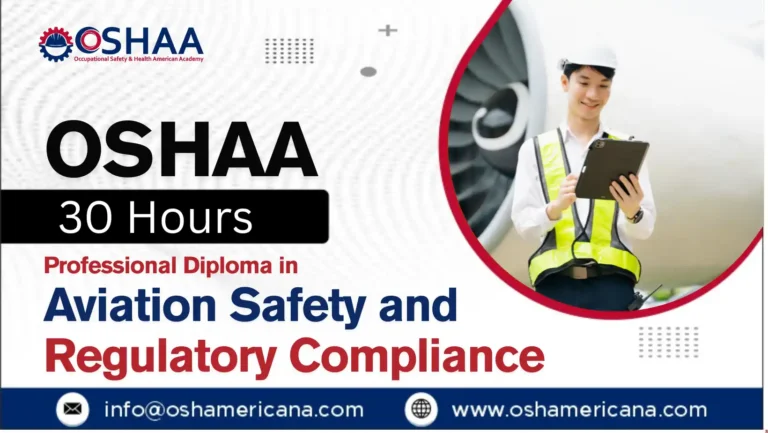Gain expertise in medical device risk management with the OSHAA 30-Hours ISO 14971:2019 – Risk Management Application on Medical Devices Lead Auditor course. Enhance compliance, quality, and professional growth.
The medical device sector is one of the most regulated and safety-critical industries in the world, where precision, compliance, and accountability are vital to ensuring patient well-being. The OSHAA 30-Hours ISO 14971:2019 – Risk Management Application on Medical Devices Lead Auditor course provides a comprehensive understanding of global standards governing risk management for medical devices. This specialized qualification equips professionals with the expertise needed to evaluate, implement, and audit risk management systems in alignment with ISO 14971:2019, the international benchmark for medical device safety.
Through this professional training, participants develop a thorough understanding of risk assessment principles, regulatory frameworks, and quality management systems that define safe medical device design, production, and lifecycle management. The OSHAA 30-Hours ISO 14971:2019 – Risk Management Application on Medical Devices Lead Auditor course focuses on enhancing the ability to identify potential hazards, assess associated risks, and implement effective mitigation strategies that ensure patient and user safety. Learners gain the technical competence required to perform internal and external audits, monitor compliance, and guide organizations toward continuous improvement in line with global medical device safety standards.
ISO 14971:2019 serves as the cornerstone for managing risks in medical device development and manufacturing. The OSHAA 30-Hours ISO 14971:2019 – Risk Management Application on Medical Devices Lead Auditor course ensures that participants not only understand the theoretical aspects of this standard but also develop the capability to apply it effectively in real-world settings. The curriculum integrates detailed case studies, practical auditing techniques, and documentation processes essential for regulatory compliance and certification readiness. This ensures that professionals are well-prepared to conduct audits that align with ISO standards and satisfy both internal quality goals and international regulatory requirements.
Professionals enrolling in the OSHAA 30-Hours ISO 14971:2019 – Risk Management Application on Medical Devices Lead Auditor program gain the tools to lead risk management teams, drive compliance initiatives, and maintain the highest levels of operational integrity. The course also addresses key intersections between ISO 14971:2019 and other global regulatory frameworks such as ISO 13485, FDA regulations, and EU MDR requirements, ensuring learners have a holistic understanding of the compliance landscape. This integrated approach enables auditors and quality managers to align organizational systems with international expectations for safety and performance.
Designed for lead auditors, quality assurance specialists, and regulatory professionals, the OSHAA 30-Hours ISO 14971:2019 – Risk Management Application on Medical Devices Lead Auditor course provides a strong foundation for advancing careers in the medical device industry. It enhances participants’ ability to ensure product reliability, improve patient outcomes, and minimize risks across all stages of device development. Graduates of this program are equipped to lead audit processes, support regulatory compliance, and contribute to the ongoing improvement of quality management systems in healthcare technology sectors worldwide.
The OSHAA 30-Hours ISO 14971:2019 – Risk Management Application on Medical Devices Lead Auditor course is a globally recognized qualification that bridges technical knowledge and regulatory excellence. By completing this advanced training, professionals strengthen their credibility, improve organizational compliance, and play a vital role in promoting safety and innovation in the medical device industry. This diploma serves as a significant step toward professional mastery, ensuring that participants are fully equipped to uphold international standards of quality, safety, and ethical responsibility in medical device risk management.
OSHAA 30-Hours ISO 14971:2019 – Risk Management Application on Medical Devices Lead Auditor
To enroll in the OSHAA 30-Hours ISO 14971:2019 – Risk Management Application on Medical Devices Lead Auditor, learners are expected to meet the following criteria. These requirements ensure that participants possess the foundational knowledge, analytical skills, and language proficiency necessary to successfully complete this advanced professional diploma and apply its principles in real-world medical device risk management environments.
1. Age Requirement
- Applicants must be at least 18 years of age at the time of enrollment in the OSHAA 30-Hours ISO 14971:2019 – Risk Management Application on Medical Devices Lead Auditor course.
- This minimum age ensures that learners have the maturity and professional readiness required to engage with complex auditing, regulatory, and compliance topics.
- Individuals meeting this age criterion are better equipped to understand the ethical, technical, and procedural standards involved in medical device risk management.
2. Educational Background
- A minimum of a secondary school education or equivalent qualification is required to enroll in the OSHAA 30-Hours ISO 14971:2019 – Risk Management Application on Medical Devices Lead Auditor course.
- A higher education background in engineering, biomedical sciences, quality management, or a related technical discipline is strongly recommended, as it enhances comprehension of ISO 14971:2019 standards and their application.
- Familiarity with quality management systems, medical device production, or regulatory frameworks offers a distinct advantage, allowing learners to connect theoretical concepts with practical audit practices.
3. Work Experience
- While prior professional experience is not mandatory, having relevant industry experience in medical devices, healthcare manufacturing, quality assurance, or regulatory compliance is highly advantageous.
- Professionals currently working in roles such as quality auditors, regulatory officers, or compliance specialists will find the OSHAA 30-Hours ISO 14971:2019 – Risk Management Application on Medical Devices Lead Auditor course particularly beneficial in strengthening their expertise.
- For newcomers to the field, this diploma provides a strong foundation in risk management processes and auditing methodologies applicable across the medical device sector.
4. English Proficiency
- Since the OSHAA 30-Hours ISO 14971:2019 – Risk Management Application on Medical Devices Lead Auditor course is conducted in English, learners must possess strong reading, writing, and speaking abilities.
- Proficiency in English ensures clear understanding of technical documents, regulatory guidelines, and audit reports in compliance with ISO 14971:2019 and related international standards.
- Effective communication skills in English also enable participants to conduct audits, prepare reports, and collaborate with multidisciplinary teams and regulatory authorities on a global scale.
Meeting these eligibility requirements ensures that participants are fully prepared to benefit from the comprehensive training offered by the OSHAA 30-Hours ISO 14971:2019 – Risk Management Application on Medical Devices Lead Auditor program. This qualification not only enhances professional competence but also equips learners with the specialized expertise needed to lead audits, manage compliance, and promote excellence in the medical device industry worldwide.
Study Units
Learning Outcomes
Introduction to ISO 14971:2019 – Risk Management for Medical Devices (3 Hours)
- Understand the purpose and scope of ISO 14971:2019 for medical device risk management.
- Recognise the key principles of risk management within the context of medical devices.
- Gain an overview of the risk management process as it applies to medical device development and lifecycle.
- Learn the importance of compliance with ISO 14971:2019 for ensuring patient safety and device efficacy.
Risk Management Process Overview and Terminology (4 Hours)
- Familiarise with the risk management process as outlined in ISO 14971:2019.
- Understand the terminology and definitions used in medical device risk management.
- Learn how to apply the risk management process across the device lifecycle, from design to post-market activities.
- Gain knowledge of key concepts such as risk assessment, risk control, and monitoring.
Risk Analysis: Identifying Hazards and Assessing Risks (5 Hours)
- Develop skills in identifying potential hazards associated with medical devices.
- Learn how to assess risks based on severity and probability.
- Understand various risk analysis techniques used in the medical device industry.
- Gain knowledge in evaluating risks related to device functionality, user safety, and environmental factors.
Risk Control Measures and Mitigation Strategies (4 Hours)
- Learn how to identify and evaluate appropriate risk control measures for mitigating identified risks.
- Understand the hierarchy of risk control measures and their implementation in the design and development of medical devices.
- Develop strategies for reducing or eliminating risks through design changes, warnings, or protective measures.
- Gain insight into how to balance risk reduction efforts with the device’s intended performance.
Auditing Risk Management Systems for Compliance (5 Hours)
- Understand the role of auditing in ensuring compliance with ISO 14971:2019.
- Learn how to audit risk management systems effectively and identify gaps in compliance.
- Develop auditing techniques to assess risk management processes, including hazard identification and risk control measures.
- Gain practical experience in performing audits of medical device risk management systems and reporting findings.
Documentation Requirements and Record Keeping in Risk Management (4 Hours)
- Understand the critical importance of documentation in risk management processes.
- Learn the key documentation requirements outlined in ISO 14971:2019 for medical devices.
- Develop skills in reviewing and assessing the quality and completeness of risk management documentation.
- Gain an understanding of the types of records necessary to demonstrate compliance with risk management standards.
Corrective Actions and Risk Management Audits (3 Hours)
- Learn how to identify non-compliance or deficiencies in risk management systems.
- Understand the process for implementing corrective actions to address audit findings.
- Develop skills in designing and tracking corrective actions and ensuring they are effectively integrated into the risk management system.
- Gain knowledge of best practices for ensuring corrective actions contribute to ongoing system improvement.
Continual Improvement and Monitoring of Risk Management Systems (2 Hours)
- Understand the principles of continual improvement in risk management processes.
- Learn how to monitor the effectiveness of risk controls and their ongoing suitability.
- Gain insight into how to evaluate risk management systems post-market and incorporate feedback for improvement.
- Develop strategies for continuously enhancing risk management practices and achieving long-term safety and compliance.
The OSHAA 30-Hours ISO 14971:2019 – Risk Management Application on Medical Devices Lead Auditor course offers a wide range of professional and organizational benefits designed to enhance expertise, ensure compliance, and strengthen global competitiveness in the medical device industry. This internationally recognized qualification provides professionals with the specialized skills needed to evaluate, implement, and audit risk management systems according to ISO 14971:2019 standards. It empowers learners to contribute to safer medical device production, regulatory compliance, and quality improvement while supporting professional advancement and operational excellence across the sector.
1. Comprehensive Understanding of ISO 14971:2019
- Gain an in-depth understanding of the principles, structure, and application of ISO 14971:2019 standards in medical device risk management.
- Learn how to interpret and apply key requirements for identifying, analyzing, and mitigating potential risks throughout the product lifecycle.
- Develop the ability to implement consistent risk management frameworks that meet international regulatory expectations.
2. Enhanced Audit Competence
- Build strong auditing skills required to conduct, lead, and manage ISO 14971:2019 compliance audits effectively.
- Understand audit planning, documentation, reporting, and corrective action follow-ups in medical device environments.
- Strengthen professional credibility as a certified lead auditor recognized for high-level technical competence and regulatory expertise.
3. Regulatory Compliance and Global Recognition
- Master the essential aspects of compliance with international medical device regulations, including EU MDR, FDA requirements, and ISO standards.
- Ensure that organizations meet global regulatory expectations, reducing non-compliance risks and legal liabilities.
- Improve organizational reputation and trust through effective application of ISO 14971:2019 risk management systems.
4. Improved Product Safety and Quality
- Learn to identify potential hazards, assess risks, and implement mitigation measures to enhance patient and user safety.
- Strengthen quality assurance frameworks that align with ISO 13485 and related quality management systems.
- Support organizations in maintaining high standards of product reliability and safety performance.
5. Professional Growth and Career Advancement
- Attain an internationally recognized certification that opens doors to leadership roles in auditing, compliance, and regulatory affairs.
- Enhance professional credibility as a qualified expert in medical device risk management and auditing.
- Increase employability across global medical device companies, certification bodies, and healthcare organizations.
6. Practical Application of Risk Management Techniques
- Gain hands-on experience in applying risk assessment tools, including FMEA, FTA, and HACCP, within medical device contexts.
- Learn to evaluate risk control measures, verify their effectiveness, and document results according to ISO 14971:2019 guidelines.
- Develop the ability to make data-driven decisions that improve product safety and organizational efficiency.
7. Organizational Efficiency and Cost Reduction
- Implement structured risk management processes that minimize product recalls, production errors, and financial losses.
- Improve operational efficiency by reducing process variability and ensuring regulatory readiness.
- Strengthen decision-making frameworks to optimize resource utilization and minimize compliance costs.
8. Leadership and Communication Skills
- Develop leadership skills necessary for managing audit teams and communicating findings to cross-functional departments.
- Improve professional communication to effectively present audit results, corrective actions, and improvement strategies.
- Build confidence in leading discussions on quality, safety, and compliance at both technical and managerial levels.
9. Strategic Contribution to Business Continuity
- Learn to integrate risk management into the organizational strategy for enhanced resilience and long-term stability.
- Support proactive identification and mitigation of business-critical risks across production and supply chain processes.
- Contribute to sustainable growth through continuous improvement in product design, development, and post-market surveillance.
10. Strengthened Documentation and Reporting Skills
- Gain expertise in preparing and maintaining accurate audit and compliance documentation in line with ISO 14971:2019.
- Learn to generate professional audit reports that demonstrate adherence to regulatory standards and best practices.
- Enhance organizational transparency through systematic documentation and communication of risk management processes.
11. Alignment with International Standards
- Understand how ISO 14971:2019 integrates with other international standards such as ISO 13485, ISO 9001, and IEC 60601.
- Promote standardization across global operations, ensuring consistency and regulatory alignment.
- Facilitate certification and accreditation processes through a unified approach to risk management and quality assurance.
12. Continuous Improvement and Innovation
- Develop a mindset focused on continuous improvement within medical device design and manufacturing.
- Apply auditing insights to identify improvement opportunities and foster innovation in safety and quality practices.
- Contribute to advancing organizational excellence and competitiveness in the global medical device market.
13. Ethical and Responsible Practice
- Understand the ethical responsibilities of lead auditors in maintaining integrity and transparency during risk assessments.
- Promote accountability and ethical decision-making in compliance with ISO 14971:2019 standards.
- Support patient safety and regulatory trust through responsible and consistent audit practices.
14. Strengthened Collaboration with Stakeholders
- Learn to coordinate effectively with regulatory bodies, suppliers, and internal teams to ensure alignment with risk management policies.
- Enhance stakeholder engagement through clear communication and collaborative audit planning.
- Build strong professional relationships that contribute to organizational success and compliance excellence.
15. Global Career Opportunities
- Obtain a globally recognized qualification that expands professional opportunities across medical device industries worldwide.
- Gain the flexibility to work with international regulatory authorities, certification bodies, and healthcare product manufacturers.
- Establish a competitive edge in the rapidly evolving global healthcare and life sciences sector.
The OSHAA 30-Hours ISO 14971:2019 – Risk Management Application on Medical Devices Lead Auditor course is an invaluable qualification for professionals seeking excellence in medical device auditing and compliance. It empowers learners to contribute to safer healthcare outcomes, uphold regulatory integrity, and drive professional success through globally recognized expertise in risk management and quality assurance.
The OSHAA 30-Hours ISO 14971:2019 – Risk Management Application on Medical Devices Lead Auditor course is designed for professionals involved in the design, development, regulation, and auditing of medical devices. This course caters to individuals and organizations seeking to strengthen their understanding of risk management principles and ensure compliance with international safety and quality standards. It is particularly relevant to those responsible for maintaining product safety, quality assurance, and regulatory alignment in the global medical device industry. By aligning with OSHA and ISO standards, this training ensures that professionals gain the competence and confidence to manage risk effectively, conduct audits efficiently, and uphold the highest standards of medical device safety and performance.
1. Quality Assurance and Regulatory Professionals
- Play a critical role in ensuring that medical devices meet global safety and quality standards.
- This course enhances their knowledge of ISO 14971:2019 principles and auditing procedures.
- Helps them ensure compliance with international regulations and improve audit readiness.
- Supports professional development in maintaining organizational regulatory compliance and risk management efficiency.
2. Medical Device Design and Development Engineers
- Involved in the creation, testing, and refinement of medical devices throughout the product lifecycle.
- Gain practical understanding of how risk management integrates with product design and validation processes.
- Strengthen their ability to identify, assess, and mitigate risks associated with product design.
- Learn to apply ISO 14971:2019 requirements to improve safety, reliability, and regulatory acceptance of devices.
3. Internal and External Auditors
- Responsible for conducting audits that ensure compliance with ISO and OSHA-based safety systems.
- This course provides the skills to plan, perform, and lead audits aligned with ISO 14971:2019 requirements.
- Develop a systematic approach to evaluating organizational risk management frameworks.
- Improve audit performance and accuracy in documenting non-conformities and corrective actions.
4. Compliance and Risk Management Officers
- Oversee regulatory adherence and organizational risk control processes.
- Learn advanced techniques for identifying, analyzing, and mitigating risks throughout device development and production.
- Strengthen the ability to align internal policies with global ISO and OSHA safety frameworks.
- Enhance risk assessment documentation and reporting for improved operational transparency.
5. Manufacturing and Production Managers
- Oversee day-to-day production operations within medical device manufacturing environments.
- Gain insights into implementing effective risk management strategies in production systems.
- Learn to minimize operational hazards and maintain compliance with ISO 14971:2019 standards.
- Improve quality control processes and contribute to overall production efficiency and cost-effectiveness.
6. Healthcare Product Safety Specialists
- Responsible for monitoring and managing safety concerns related to medical device usage.
- This course deepens their understanding of product safety assessment and post-market surveillance.
- Provides tools for evaluating device performance and risk throughout its lifecycle.
- Supports proactive measures to prevent incidents and enhance patient safety.
7. Project Managers and Team Leaders
- Coordinate multidisciplinary teams in the design, production, and compliance of medical devices.
- Learn to integrate risk management practices into project planning and execution.
- Enhance leadership capabilities by understanding risk-based decision-making principles.
- Strengthen coordination between design, quality, and compliance teams for operational success.
8. Consultants and Certification Body Representatives
- Work with clients or organizations seeking ISO 14971:2019 certification and regulatory alignment.
- Gain expertise in evaluating and auditing client risk management systems effectively.
- Strengthen professional credibility by mastering global safety and quality audit standards.
- Improve advisory services by aligning client systems with ISO and OSHA-based compliance frameworks.
9. Health, Safety, and Environment (HSE) Professionals
- Focus on workplace and product safety across the medical device manufacturing process.
- Learn to apply risk management methodologies to identify and control potential hazards.
- Ensure compliance with OSHA standards and medical device safety protocols.
- Enhance professional capabilities in developing safer operational practices and environments.
10. Academic and Research Professionals
- Involved in teaching, research, and innovation in biomedical engineering or healthcare technology.
- Gain exposure to real-world applications of ISO 14971:2019 in research and development settings.
- Learn how risk management principles apply to product innovation and compliance studies.
- Strengthen academic and professional profiles through certification in globally recognized auditing standards.
The OSHAA 30-Hours ISO 14971:2019 – Risk Management Application on Medical Devices Lead Auditor course equips a wide range of professionals with the advanced knowledge, practical skills, and global certification necessary to uphold medical device safety, quality, and compliance. It empowers participants to contribute to organizational excellence, reduce operational risks, and align with internationally recognized ISO and OSHA standards, ensuring safer, more reliable, and compliant medical devices in the global healthcare market.







